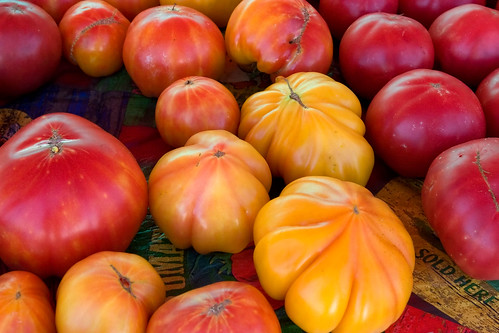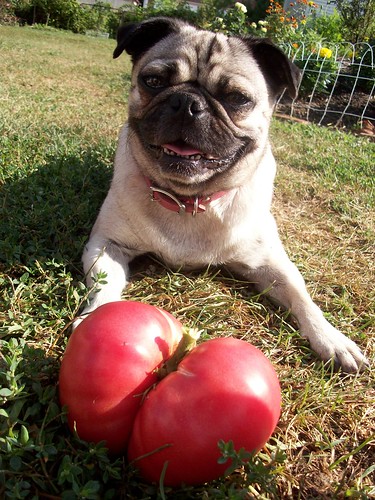
Scientific American has an interesting article on the lack of genetic diversity in heirloom tomatoes--which surprises me, since I always assumed that heirlooms were older and much more diverse than those cardboard-like grocery store brands. According to the article, there are only about ten mutant genes that cause the whole spectrum of heirloom varieties! And take it from me (who works in a genetics lab), ten mutant genes is really not very much at all. (A whole tomato genome is made up of about 35,000 genes.) Unfortunately, this means that these tomatoes are very susceptible to fungal infections. Monsanto is working on a project to reintroduce disease-resistant genes into tomato lines. This is probably good news overall for farmers and gardeners, but I just don't trust Monsanto at all. So we'll see where this all goes...

One quote really caught my eye: "Heirlooms are the tomato equivalent of the pug—that 'purebred' dog with the convoluted nose that snorts and hacks when it tries to catch a breath."
One thing's for sure: genetically inbred or not, heirloom tomatoes and pugs are both wonderful things!
(Side note, check out the photos that come up when you search Flickr for "tomato pug." They're hilarious.)
Does this mean your dogs are susceptible to fungus? Because that would make things easier. Also, wtf is Monsanto.
ReplyDeleteMonsanto is a agricultural/biotech company that is known for some pretty shady dealings. Many of their seeds are genetically "programed" to die after one lifecycle, so farmers can't save seeds for the next year and must instead buy more. They also created a strain of seeds that is resistant to their herbicide called Roundup, so that a farmer could plant Roundup resistant wheat and then spray the fields with the herbicide to kill everything else. But these seeds often hybridize with plants in neighboring fields (because that's what airborne pollinators tend to do...) and then Monsanto sues the neighboring farms for stealing their technology and infringing on their patent rights. Basically, they're thugs of the agricultural world.
ReplyDeleteAnd no, my pugs are not susceptible to fungi. Nor herbicides. That said, let's not test it, k?
Alana, Monsanto isn't really as bad as you make them out to be. The seeds are not supposed to be saved, because that's how Monsanto makes its money, and when you buy them, you agree to only plant them for one year and not harvest the seeds for the following year. If they let you grow them for seed corn, they'd have to charge 10 times more. No one gets sued for hybridizing. The only people (actually, just one famous farmer) who get sued are people who save and replant seed in violation of the license they agreed upon in advance. Round-up Ready wheat is a pretty cool idea, and it reduces the amount of chemical treatments the plants need. Not really so bad, but they do like to enforce their rights to their innovations.
ReplyDeleteI've got to disagree with you, Dad. Monsanto has sued many farmers who never bought their seeds in the first place for patent infringement when hybridized plants were found on their properties. Most famously, check out Monsanto Canada Inc. vs. Schmeiser. This isn't a case of replanting Monsanto seeds (their terminator gene makes that difficult), but rather a farmer who never bought Roundup-resistant seed getting convicted of patent violations for having hybridized resistant plants on his property and replanting their seeds. That's pretty messed up to me.
ReplyDelete(To say nothing of the ethical issues involved in patenting a species or a life form... they're working on a genetically modified breed of pigs next, and it's a slippery slope of what life is "patent-able." Harvard mouse or no, it's a scary concept.)